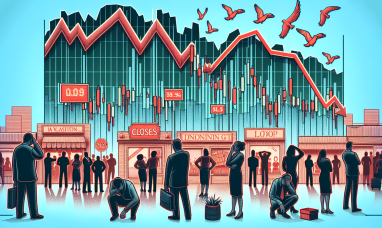Following the latest earnings report, shares of luxury retail giant LVMH (OTCMKTS:LVMUY) have seen a decline of over 27% from their mid-July peak of around $200 per share. Undoubtedly, the surge in high-end discretionary goods has waned, with “aspirational” buyers, and middle-class consumers aspiring to own LVMH products as status symbols, being most affected by inflation and renewed recession concerns. Meanwhile, the savings that consumers accumulated during the early days of the pandemic have been largely depleted.
As the cost of living continues to rise, it appears unlikely that aspirational consumers will return to extravagant spending in the near future, especially with increasing recession risks linked to every upward move in the 10-year yield.
LVMH Navigates Challenging Times
True to expectations, LVMH recently reported a surprising shortfall in third-quarter revenue, with sales totaling 19.96 billion euros (approximately $21.2 billion), showing minimal year-over-year growth. While the wine and spirits division faced setbacks, the perfumes & cosmetics and fashion & leather goods segments remained relatively flat. This suggests that LVMH, one of the most resilient luxury performers in the retail world, is now starting to experience the impact of broader macroeconomic headwinds.
In a prior analysis, it was noted that aspirational consumers had significantly fueled the company’s post-pandemic surge to all-time highs. However, concerns were raised regarding the diminishing spending power of this consumer group, which was expected to become a significant challenge for the company as we entered autumn. As a result, it was suggested that shares might need to “give back a substantial portion of their gains” from the post-lockdown spending spree.
Fast forward to today, and LVMH finds itself in a bear market, with its shares trading at around $146. After this challenging period, the stock now holds a P/E ratio of approximately 22 times, making it relatively inexpensive for exposure to the upper echelon of the luxury goods market, or at least very close to it.
However, consumer-related headwinds may continue to exert downward pressure on the stock, possibly testing support levels below $130.
While the current dip might prove to be an attractive long-term entry point, investors should be prepared for the prominent ups and downs associated with shifting consumer sentiments and economic expectations on a global scale. After all, LVMH and other luxury retailers are part of the consumer discretionary sector, and in times when disposable income is scarce for all but the most affluent consumers, high-end handbags, fragrances, and clothing may not be a top priority.
Wall Street Sees Luxury Retailers as Bargains
While you might not find any of LVMH’s prestigious brands (such as Louis Vuitton, Tiffany, and Dior) on the clearance rack, the stock appears to be on sale after the markdown it experienced in August and September. A few Wall Street analysts seem to share this sentiment.
Despite the stock possibly not reaching its lowest point yet, Morgan Stanley and Bank of America maintain a positive outlook on high-end retailers like LVMH, even in the face of consumer headwinds. Morgan Stanley went so far as to call these luxury retailers, including LVMH, a bargain at current levels, highlighting that operating margins may remain at “historical highs in the coming years.”
Morgan Stanley’s evaluation of LVMH as a value investment is justified, considering its robust brands as a protective moat. While a recession could impact growth in the medium term, it may be challenging to halt the high-margin growth on the other side of the economic slowdown.
In alignment with Morgan Stanley’s optimistic stance, Bank of America has also given luxury firms a vote of confidence, emphasizing the importance of investor patience.
Indeed, luxury companies are still navigating through challenging waters. Nevertheless, given their current valuations, investors with a strong stomach for volatility and an eye for value may want to closely monitor these stocks. When the economic tide eventually turns, LVMH may be poised to regain its momentum.
Conclusion
LVMH is beginning to feel the squeeze from inflation and consumer challenges, yet its long-term prospects remain promising. The question that lingers is how much of the stock’s ascent to all-time highs will be retraced as we approach the end of the year.
Featured Image: Freepik @ kristy2ng















